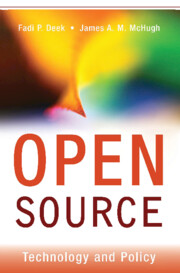Book contents
- Frontmatter
- Contents
- Preface
- Acknowledgments
- 1 Introduction
- Section One Open Source – Internet Applications, Platforms, and Technologies
- Section Two Social, Psychological, Legal, and Economic Aspects of Open Source
- Section Three Free Software: The Movement, The Public Sector, and the Future
- Glossary
- Subject Index
- Author Index
Preface
Published online by Cambridge University Press: 16 January 2010
- Frontmatter
- Contents
- Preface
- Acknowledgments
- 1 Introduction
- Section One Open Source – Internet Applications, Platforms, and Technologies
- Section Two Social, Psychological, Legal, and Economic Aspects of Open Source
- Section Three Free Software: The Movement, The Public Sector, and the Future
- Glossary
- Subject Index
- Author Index
Summary
The story of free and open software is a scientific adventure, packed with extraordinary, larger-than-life characters and epic achievements. From infrastructure for the Internet to operating systems like Linux, this movement involves some of the great accomplishments in computing over the past quarter century. The story encompasses technological advances, global software collaboration on an unprecedented scale, and remarkable software tools for facilitating distributed development. It involves innovative business models, voluntary and corporate participation, and intriguing legal questions. Its achievements have had widespread impact in education and government, as well as historic cultural and commercial consequences. Some of its attainments occurred before the Internet's rise, but it was the Internet's emergence that knitted together the scientific bards of the open source community. It let them exchange their innovations and interact almost without regard to constraints of space, time, or national boundary. Our story recounts the tales of major open community projects: Web browsers that fueled and popularized the Internet, the long dominant Apache Web server, the multifarious development of Unix, the near-mythical rise of Linux, desktop environments like GNOME, fundamental systems like those provided by the Free Software Foundation's GNU project, infrastructure like the X Window System, and more. We will encounter creative, driven scientists who are often bold, colorful entrepreneurs or eloquent scientific spokesmen. The story is not without its conflicts, both internal and external to the movement.
- Type
- Chapter
- Information
- Open SourceTechnology and Policy, pp. ix - xPublisher: Cambridge University PressPrint publication year: 2007



